Hiking is a popular outdoor activity enjoyed by many people around the world. It involves walking for long distances on natural trails, often through forests or mountains. The activity is not only a great form of exercise, but it also provides a chance to connect with nature and enjoy the scenery.
This addiction is not necessarily a bad thing, as hiking has numerous benefits for physical and mental health. However, it is important to understand why hiking can be addictive and how to prevent it from becoming a problem. In this article, let’s explore the reasons why hiking is addictive, the benefits of hiking, and how these benefits can lead to addiction. I will also provide tips for preventing hiking addiction and information about how to overcome it if it does become a problem.

Key Takeaways
- Hiking is addictive because it releases endorphins and provides a sense of accomplishment.
- Hiking has numerous benefits for physical and mental health.
- To prevent hiking addiction, set realistic goals, take breaks when needed, and hike with friends or family. If hiking addiction does become a problem, seek professional help.
Why Hiking is Addictive
I have always found hiking to be an addictive activity, and I’m not alone. Many people find themselves hooked on the experience of hiking, and there are several reasons why.
One of the main reasons that hiking is addictive is because of the physical benefits it provides. Hiking is a great form of exercise that strengthens the body, helps you stay fit, and makes you feel healthier overall. Additionally, hiking can help reduce stress and anxiety, which can be incredibly beneficial for mental health.

Another reason why hiking is addictive is the sense of adventure and excitement it provides. When you’re out on the trail, you never know what you might encounter. Whether it’s a stunning view, a challenging obstacle, or a new wildlife sighting, hiking always has the potential to surprise and delight.
Finally, hiking can be addictive because of the sense of accomplishment it provides. When you complete a challenging hike, you feel a sense of pride and satisfaction that can be incredibly rewarding. This feeling can keep you coming back to the trail again and again, always seeking out new challenges and experiences.
Overall, hiking is an addictive activity for a variety of reasons. It provides physical and mental benefits, a sense of adventure and excitement, and a feeling of accomplishment. It’s no wonder so many people find themselves hooked on the experience of hiking.
Related Posts:
The Benefits of Hiking
As someone who loves hiking, I can attest to the fact that it is an addictive activity that offers numerous benefits. In this section, I will discuss the physical, mental, and social benefits of hiking.
Physical Benefits
Hiking is an excellent form of exercise that provides numerous physical benefits. It is a low-impact activity that is easy on the joints, making it an ideal exercise for people of all ages. Some of the physical benefits of hiking include:
- Improved cardiovascular health
- Increased muscle strength and endurance
- Reduced risk of chronic diseases such as heart disease, diabetes, and obesity
- Improved balance and coordination
- Weight loss and management

Mental Benefits
Hiking is not just good for your body, but it is also good for your mind. Spending time in nature has been shown to have numerous mental health benefits. Some of the mental benefits of hiking include:
- Reduced stress and anxiety
- Improved mood and self-esteem
- Increased creativity and productivity
- Enhanced cognitive function and memory
- Reduced symptoms of depression

Social Benefits
Hiking is a great way to connect with others and build relationships. It can be a solo activity, but it can also be a group activity that provides numerous social benefits. Some of the social benefits of hiking include:
- Increased sense of community and belonging
- Improved communication and teamwork skills
- Opportunities to meet new people and make new friends
- Enhanced social support and accountability
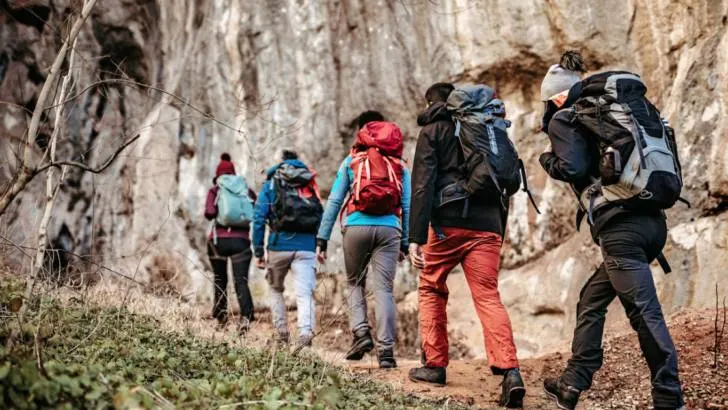
Related Posts:
Why These Benefits Can Lead to Addiction
Crushing Goals
When I hike, I often set a goal for myself, whether it’s reaching a certain peak or completing a certain number of miles. When I achieve that goal, I feel an immense sense of accomplishment and satisfaction. This feeling can be addictive, and I find myself wanting to set even more challenging goals for myself. The sense of achievement and progress is a powerful motivator, and it can keep me coming back to the trails time and time again.
Exploration
Hiking allows me to explore new places and see things I wouldn’t be able to see otherwise. Whether it’s a hidden waterfall or a stunning view from a mountaintop, there’s always something new to discover on the trails. This sense of exploration and discovery can be incredibly addictive, and it keeps me coming back to the trails to see what else I can find.

Nature
One of the biggest draws of hiking for me is being out in nature. The fresh air, the sounds of birds and wildlife, and the beauty of the natural world all have a calming and rejuvenating effect on me. This connection to nature can be addictive, and it keeps me coming back to the trails to experience it again and again.
Related Posts:
Studies That Have Looked at the Addictive Nature of Hiking
Hiking is a popular outdoor recreational activity that has been found to be addictive by many people. Several studies have looked at the addictive nature of hiking, and the findings have shown that hiking can be an addictive behavior.
One study conducted by OutdoorSpree found that hiking can lower stress and reduce anxieties. The study also found that some people, such as writers, singers, and photographers, find inspiration through sightseeing nature. These reasons and more are enough for hiking to be addictive.
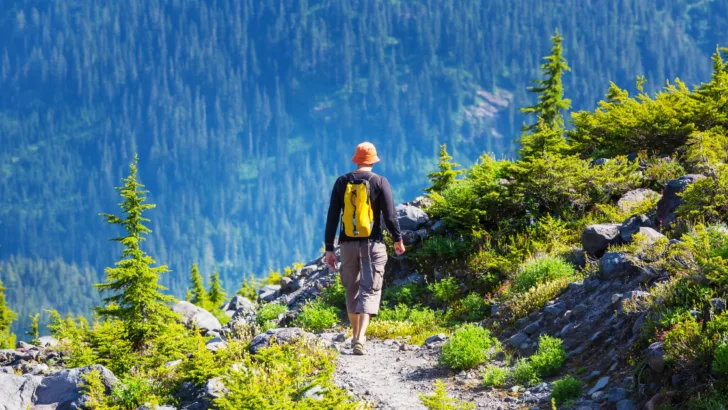
Another study conducted by Stanford researchers found that spending time in nature can improve mental health. The study found that nature can reduce symptoms of depression and anxiety, improve mood, and increase cognitive functioning. These benefits of spending time in nature can contribute to the addictive nature of hiking.
Additionally, a study conducted by The Trek found that thru-hiking, which is hiking a long-distance trail from end to end, can be an addiction. The study found that the reward system in the brain is activated during thru-hiking, which can lead to addictive behavior. Thru-hiking can also provide a sense of accomplishment and a feeling of being part of a community, which can contribute to its addictive nature.
Overall, several studies have found that hiking can be an addictive behavior. The benefits of spending time in nature, such as reducing stress and improving mental health, can contribute to the addictive nature of hiking.
Set Realistic Goals for Yourself
Setting realistic goals is crucial when it comes to hiking. It’s important to set goals that are challenging yet achievable. This will help you stay motivated and avoid feeling discouraged.
When setting your goals, consider your fitness level, experience, and the difficulty of the trail. If you’re a beginner, start with shorter trails and gradually increase the distance and elevation over time. If you’re an experienced hiker, challenge yourself with longer and more difficult trails.
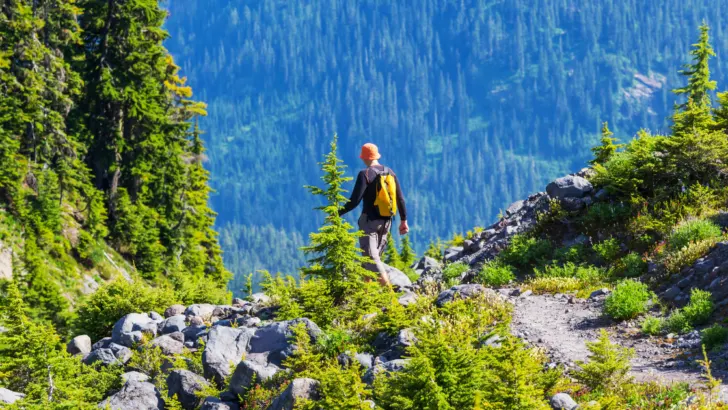
It’s also important to consider the time and resources you have available. If you have limited time, choose a trail that you can complete within your available time frame. If you have limited resources, choose a trail that is closer to home and doesn’t require expensive gear.
To help you set realistic goals, consider using the SMART method: Specific, Measurable, Achievable, Relevant, and Time-bound. This will help you create goals that are clear, quantifiable, and achievable within a specific time frame.
Here’s an example of a SMART goal: “I will hike 5 miles on a moderate trail within 2 hours, twice a week for the next 4 weeks.” This goal is specific, measurable, achievable, relevant, and time-bound.

Remember to celebrate your accomplishments along the way, no matter how small they may seem. This will help you stay motivated and continue to push yourself to achieve your goals.
Related Posts:
Don’t Hike Too Often or for Too Long
As much as I love hiking, it’s important to remember that too much of a good thing can be harmful. Hiking too often or for too long can lead to physical and mental exhaustion and even injury.
When planning my hiking schedule, I make sure to give myself enough time to rest and recover between hikes. I also try to vary my activities, so I’m not always doing the same type of hike or trail. This helps prevent overuse injuries and keeps things interesting.
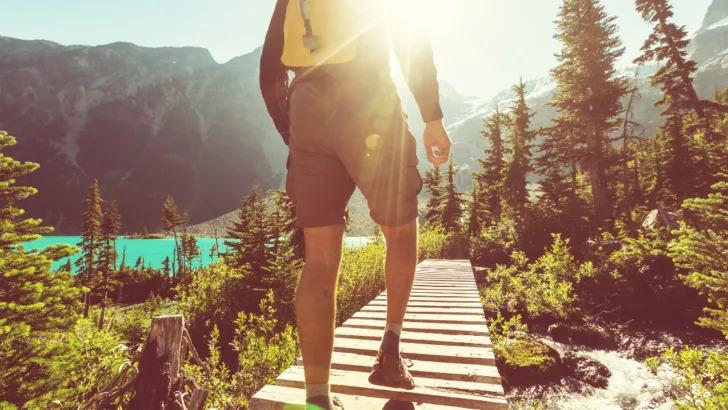
Another important factor to consider is the length of the hike. It can be tempting to push myself to go farther and longer each time, but this can also lead to burnout. I make sure to listen to my body and take breaks when needed. It’s better to take it slow and steady than to risk injury or exhaustion.
In addition to physical considerations, it’s important to also take care of my mental health. Hiking can be a great way to reduce stress and clear my mind, but too much of it can also be overwhelming. I make sure to balance my hiking with other activities that bring me joy and relaxation.
Overall, while hiking can be addictive, it’s important to remember to take care of myself and not overdo it. By being mindful of my physical and mental health, I can continue to enjoy hiking for years to come.
Take Breaks When You Need Them
As someone who has hiked many trails, I can say that taking breaks when you need them is crucial to a successful and enjoyable hike. It’s important to listen to your body and rest when you feel tired or need to catch your breath.
When planning your hike, consider the terrain, distance, and fitness level. If you’re a beginner, start with shorter hikes and take breaks more frequently. As you gain experience and stamina, you can increase the distance and reduce the number of breaks.

During breaks, take the time to hydrate and refuel with snacks. It’s also a good opportunity to check your map and make sure you’re on the right track. If you’re hiking with a group, breaks can be a chance to socialize and enjoy the scenery together.
It’s important to note that taking breaks doesn’t mean you’re not capable of completing the hike. It’s a smart and safe way to conserve your energy and avoid injury. Pushing yourself too hard can lead to exhaustion, dehydration, and other health issues.
In summary, taking breaks when you need them is a key aspect of hiking. It allows you to rest, refuel, and enjoy the experience. Don’t be afraid to take breaks, even if you’re an experienced hiker. Your body will thank you for it.
Listen to Your Body
As someone who has hiked extensively, I can attest to the fact that hiking can be addictive. But, as with any physical activity, it is important to listen to your body. This means paying attention to any aches, pains, or discomfort you may feel during the hike. If you feel like you need to take a break, then take a break. If you feel like you need to turn back, then turn back. It is important to push yourself, but not to the point of injury.
One way to listen to your body is to be aware of your breathing. Hiking is a great way to strengthen your lungs and cardiovascular system, but it is important to not overexert yourself. If you find yourself gasping for air or feeling dizzy, then slow down and take deep breaths. This will help you regulate your breathing and prevent any potential health issues.

Another way to listen to your body is to be aware of your hydration levels. Dehydration can be a serious issue while hiking, especially in hot weather or at high altitudes. Make sure to bring enough water with you and take frequent breaks to drink. If you feel thirsty, then you are already dehydrated.
In summary, listening to your body is crucial while hiking. Pay attention to any aches, pains, or discomfort you may feel, regulate your breathing, and stay hydrated. By doing so, you can enjoy the addictive benefits of hiking while also staying safe and healthy.
Related Posts:
Hike with Friends or Family
I find hiking with friends or family to be a great way to share the experience and create lasting memories. Here are some reasons why:
- Motivation: Hiking with others can be a great motivator. When you know someone is counting on you to show up, you’re more likely to follow through. Plus, hiking with others can be a lot of fun and make the experience more enjoyable.
- Safety: Hiking with others can also be safer. If someone gets injured or lost, there are others to help out and provide support. It’s always better to have someone else around in case of an emergency.
- Shared Experience: Hiking with others allows you to share the experience with someone else. You can talk about the scenery, wildlife, and other interesting things you see along the way. Plus, you can create memories and stories that you can share with others for years to come.
- Teamwork: Hiking with others can also be a great opportunity for teamwork. You can work together to navigate the trail, help each other over difficult terrain, and share the load of carrying gear. It’s a great way to build camaraderie and strengthen relationships.

Overall, hiking with friends or family can be a great way to enhance the hiking experience. It provides motivation, safety, shared experience, and teamwork. If you haven’t tried hiking with others, I highly recommend giving it a try.
Tips for Preventing Hiking Addiction
As someone who enjoys hiking, I know how easy it is to get addicted to it. Here are some tips that I have found helpful in preventing hiking addiction:
- Set realistic goals: It’s important to set achievable goals for yourself when it comes to hiking. Don’t push yourself too hard too soon. Start with shorter hikes and gradually increase the difficulty level as you become more experienced.
- Take breaks: It’s important to take breaks during your hike. Stop and rest every once in a while. Take in the scenery and enjoy the moment. This will help prevent burnout and keep you from becoming too obsessed with hiking.
- Mix it up: Don’t just stick to one trail or location. Explore different trails and areas. This will keep things interesting and prevent you from getting bored or burnt out.
- Stay hydrated and nourished: Make sure to drink plenty of water and eat nutritious snacks during your hike. This will help keep your energy levels up and prevent you from becoming too fatigued.
- Listen to your body: Pay attention to how your body feels during your hike. If you start to feel overly fatigued or experience pain, it’s important to stop and rest. Pushing yourself too hard can lead to injury and burnout.

By following these tips, you can enjoy hiking without becoming addicted to it. Remember to take it slow, mix it up, and listen to your body. Happy hiking!
Information About How to Overcome Hiking Addiction
As someone who has experienced the addictive nature of hiking, I understand how difficult it can be to overcome this addiction. Here are some tips that have helped me:
- Recognize the problem: The first step in overcoming any addiction is to recognize that you have a problem. Acknowledge that hiking has become an addiction and is negatively affecting your life.
- Set realistic goals: Set realistic goals for yourself. Instead of trying to quit hiking altogether, try to limit the amount of time you spend hiking each week.
- Find a new hobby: Find a new hobby to replace hiking. This will help you redirect your energy and focus on something else.
- Seek professional help: If you are struggling to overcome your addiction, seek professional help. A therapist or counselor can help you work through your addiction and develop strategies to overcome it.
- Join a support group: Joining a support group can be helpful in overcoming addiction. There are many hiking addiction support groups available online and in person.

It is important to remember that overcoming addiction is a process and takes time. Be patient with yourself and celebrate small victories along the way.
How to Overcome Hiking Addiction
As someone who has experienced the addictive nature of hiking, I understand how difficult it can be to overcome this addiction. However, there are steps that can be taken to help break the cycle of addictive behavior. Here are some suggestions:
Talk to a Therapist or Counselor
Seeking professional help from a therapist or counselor can be a useful tool in overcoming hiking addiction. A therapist can help you identify the underlying reasons for your addiction and provide you with strategies to manage your behavior. They can also help you develop coping mechanisms to deal with the withdrawal symptoms that may arise when you try to quit.
Join a Hiking Support Group
Joining a support group for individuals struggling with hiking addiction can be a great way to connect with others who are going through similar experiences. These groups provide a safe and supportive environment where you can share your struggles and receive guidance and encouragement from others who understand what you’re going through.
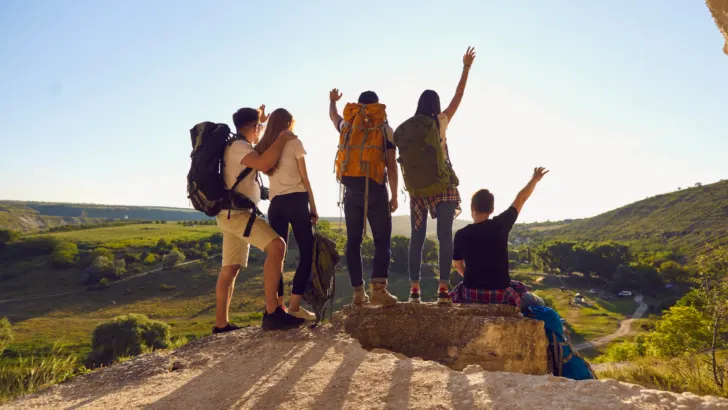
Find Other Activities to Replace Hiking
One of the keys to overcoming hiking addiction is finding other activities to replace it. Engaging in other hobbies or physical activities can help fill the void left by hiking. Consider trying activities such as yoga, swimming, or cycling. These activities can provide a similar sense of accomplishment and physical exertion as hiking.
Set New Goals for Yourself
Setting new goals for yourself can help you shift your focus away from hiking. Consider setting goals in other areas of your life, such as career or personal growth. This can help you regain a sense of purpose and direction in your life.
Remember, overcoming hiking addiction is a process that takes time and effort. Be patient with yourself and seek help when needed. With the right support and strategies, it is possible to break free from the cycle of addictive behavior and lead a fulfilling life.
Conclusion
In conclusion, I find that there are many reasons why hiking can be addictive. From the physical challenge to the mental benefits, hiking offers a unique experience that can be difficult to replicate in other activities.
One of the primary reasons why hiking can be addictive is the sense of accomplishment that comes from completing a challenging hike. Whether it’s climbing a steep mountain or completing a long-distance trail, hiking provides a tangible goal that can be achieved through hard work and dedication.
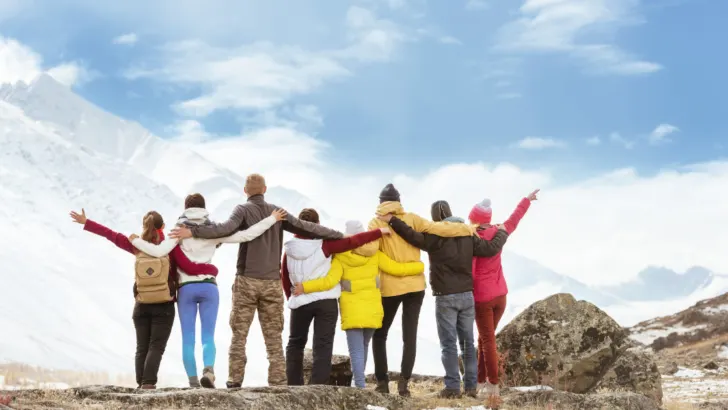
Another factor that contributes to the addictive nature of hiking is the mental benefits that come from spending time in nature. Studies have shown that spending time in nature can reduce stress and anxiety, improve mood, and even boost cognitive function.
Additionally, hiking provides a sense of community and belonging. Whether it’s through joining a hiking club or simply encountering other hikers on the trail, there is a sense of camaraderie that comes from sharing a common interest in hiking.
Overall, while hiking may not be for everyone, those who do enjoy it often find it to be a deeply rewarding and addictive activity. Whether it’s the physical challenge, the mental benefits, or the sense of community, there are many reasons why hiking can be a truly transformative experience.
Frequently Asked Questions
What are some reasons people become addicted to hiking?
There are several reasons why people become addicted to hiking. Some people find hiking to be a great way to relieve stress and clear their minds. Others enjoy the sense of accomplishment and challenge that comes with hiking difficult trails. Additionally, many people find the beauty of nature and the opportunity to explore new places to be a major draw.
How does hiking affect the brain and contribute to addiction?
Hiking can have a positive impact on the brain, releasing endorphins that can create a sense of euphoria and pleasure. This can lead to a desire to repeat the experience, contributing to addiction. Additionally, the sense of accomplishment that comes with completing a challenging hike can also contribute to a desire to continue hiking.
What are some common signs of a hiking addiction?
Some common signs of a hiking addiction include prioritizing hiking over other responsibilities, feeling restless or irritable when not hiking, and continuing to hike despite physical or mental exhaustion or injury. Additionally, those with a hiking addiction may experience withdrawal symptoms when unable to hike.
Can hiking addiction be harmful to one’s health?
While hiking can have many physical and mental health benefits, an addiction to hiking can be harmful if it leads to neglect of other responsibilities or injuries from pushing oneself too hard. It’s important to maintain a healthy balance and seek help if necessary.
What are some ways to manage a hiking addiction?
Managing a hiking addiction can involve setting boundaries and priorities, seeking support from loved ones, and finding alternative activities to fill the time and pleasure that hiking once provided. It may also involve seeking professional help if the addiction is severe.
How does hiking addiction compare to other types of addiction?
While hiking addiction may not have the same negative consequences as other types of addiction, it can still be harmful if it leads to neglect of other responsibilities or injuries. Additionally, the pleasure and euphoria associated with hiking addiction can be similar to other types of addiction. However, hiking addiction is generally considered to be less severe than other types of addiction.
Related Posts:
